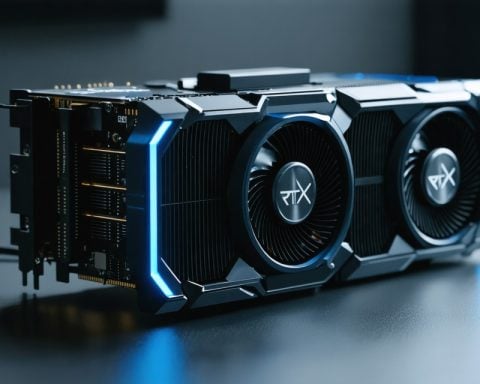Nvidia Corporation has experienced a notable dip in its stock price, with shares declining nearly 2% following the recent announcement from the Biden administration regarding tighter export controls on artificial intelligence chips. The White House highlighted that new regulations will restrict AI chips, specifically graphics processing units, from being sold without special permissions to various countries, aiming to enhance national security.
According to the latest rules, shipments of up to 1,700 GPUs remain exempt from the export cap. The administration underscored the importance of controlling AI technology to ensure it benefits allies while blocking adversaries like China from accessing advanced capabilities. Notably, U.S. allies, including countries like the UK and Taiwan, will face no restrictions.
The export limits target a specific compute capacity for AI chips shipped abroad. Analysts estimate that these constraints could significantly affect Nvidia’s capacity to meet demands, especially in markets reliant on data centers. Despite these setbacks, some analysts maintain an optimistic outlook, advising investors to hold on to Nvidia stock.
The Semiconductor Industry Association also voiced concern over the sudden regulatory shift. Leaders in the industry worry that these changes could stifle innovation and compromise the United States’ competitive edge in the growing semiconductor market. As Nvidia navigates these challenges, the tech landscape anticipates potential repercussions for the future of AI technology and innovation.
Nvidia’s Regulatory Challenges: Implications for Innovation and the Global Economy
The recent decline in Nvidia Corporation’s stock price, attributed to new export controls on artificial intelligence (AI) chips imposed by the Biden administration, signals a significant shift in the landscape of technology and trade. These regulations, designed to enhance national security by controlling the dissemination of advanced AI technology, raise critical questions about innovation, economic stability, and global relationships in the tech sector.
One of the central impacts of these export controls is on the environment, particularly in the realm of technological sustainability. As AI continues to integrate into numerous industries—ranging from healthcare to manufacturing—the demand for GPUs and other semiconductor technologies has surged. While the export restrictions on Nvidia’s products are framed as a security measure against potential adversaries, they may inadvertently lead to increased resource consumption and environmental degradation. For instance, the production of semiconductors is highly resource-intensive, involving significant energy usage and raw material extraction, which can contribute to increased carbon emissions and ecological harm.
Humanity at large stands to be affected as well. The constraints placed on AI development could delay progress in critical areas such as climate modeling, healthcare data analysis, and disaster response technologies—all of which rely on advanced computing capabilities. In a world wrestling with profound challenges like climate change, a slowdown in AI advancement may limit our ability to harness technology for proactive solutions. Conversely, the regulatory focus on national security highlights a growing divide between nations, potentially leading to reduced collaboration in scientific research and technological development that benefit global society.
The economic implications are equally striking. The Semiconductor Industry Association has raised alarms about how these regulations could stifle innovation and undermine the United States’ leadership in the semiconductor market. In a time when technological supremacy is paramount for economic stability and growth, restrictions could hinder the ability of American companies like Nvidia to compete globally. This competitive strain may lead to a shift of technological investments towards countries that do not impose such stringent regulations, ultimately altering the landscape of the semiconductor market and impacting jobs and innovation within the U.S.
Looking toward the future of humanity, the intersection of AI technology and geopolitical variables will be crucial. Nations that can maintain a balance between security and technological advancement are likely to gain a distinct competitive advantage. As the world becomes more interconnected through technology, the repercussions of these regulatory measures may echo far beyond immediate market reactions, affecting global partnerships, scientific progress, and even societal norms around privacy and data security.
In conclusion, Nvidia’s regulatory challenges serve as a microcosm of the broader implications of AI technology on our world. The delicate balance between fostering innovation, ensuring national security, and addressing environmental concerns presents a complex challenge for policymakers and industry leaders alike. As we look toward a future where technology permeates every aspect of life, navigating these complex relationships will be essential for ensuring that advancements in AI benefit humanity as a whole, rather than exacerbating existing divides.
Is Nvidia’s Future at Risk? Here’s What You Need to Know About Recent Export Restrictions
Understanding Nvidia’s Stock Decline
Nvidia Corporation has recently faced a notable decrease in its stock price, closing down nearly 2% after the Biden administration announced new, stricter export controls on artificial intelligence (AI) chips. This regulatory shift focuses on graphics processing units (GPUs), which are essential for AI application development. The White House emphasized that these changes aim to enhance national security by ensuring that advanced AI technologies do not fall into the hands of competitors like China.
Key Provisions of the New Export Controls
The latest export regulations stipulate that while shipments of up to 1,700 GPUs will remain exempt from the new caps, any sales beyond this limit require special permits. These controls target specific compute capacities for AI chips destined for international markets, significantly affecting Nvidia’s ability to fulfill demand, particularly from data centers that heavily rely on such technology.
Compliance and Global Impact
Importantly, U.S. allies—such as the UK and Taiwan—are not facing any restrictions, allowing them continued access to advanced AI technologies. However, concerns linger regarding how these measures might alter the competitive dynamics in the semiconductor industry.
Pros and Cons of the Export Controls
Pros:
– National Security: The regulations aim to restrict access to powerful AI capabilities by adversaries, thereby enhancing U.S. national security.
– Market Protection: Supports the dominance of U.S. semiconductor firms by limiting foreign competition.
Cons:
– Impact on Innovation: Industry leaders warn that such restrictions could stifle technological advancement and innovation in the semiconductor sector.
– Investment Risk: The new policies may deter investors concerned about Nvidia’s ability to thrive amid these restrictions.
Analysts’ Perspectives
Despite these challenges, some analysts maintain an optimistic outlook for Nvidia. Many suggest that investors should hold onto their shares, citing the company’s strong fundamentals and potential for growth in longer-term AI applications.
Possible Future Trends
The export regulation landscape is likely to remain fluid, with potential changes based on geopolitical developments. As countries around the world race to enhance their AI capabilities, Nvidia’s strategic decisions in response to these regulations will be crucial.
Security and Sustainability Considerations
As export controls evolve, sustainability and security of AI technology will be at the forefront of discussions. Businesses and government entities are expected to focus on enhancing their supply chains while ensuring compliance with national and international regulations.
Conclusion: Navigating the New Normal
As Nvidia navigates these export restrictions, the implications for AI technology and innovation could be significant. Industry leaders will need to balance compliance with effective growth strategies to maintain market leadership amid changing regulations.
For more information on the latest developments in technology and AI, ensure to stay updated through trusted sources. For inquiries and further details, visit Nvidia’s official page.



















